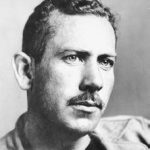
John Steinbeck (February 27, 1902 – December 20, 1968) was an American writer of 27 books, including 16 novels, 6 non-fiction books, and 5 collections of short stories. He is widely known for the comic novels (1935) and Cannery Row (1945), the multi-generation epic East of Eden (1952), and the novellas Of Mice and Men (1937) and The Red Pony (1937). The Pulitzer Prize-winning The Grapes of Wrath (1939) is considered Steinbeck’s masterpiece and part of the American literary canon. In the first 75 years since it was published, it sold 14 million copies.
In 1962, Steinbeck won the Nobel Prize for literature for his “realistic and imaginative writing, combining as it does sympathetic humor and keen social perception.”
The selection was heavily criticized, and described as “one of the Academy’s biggest mistakes” in one Swedish newspaper. The reaction of American literary critics was also harsh. The New York Times asked why the Nobel committee gave the award to an author whose “limited talent is, in his best books, watered down by tenth-rate philosophizing “noting that “. The international character of the award and the weight attached to it raise questions about the mechanics of selection and how close the Nobel committee is to the main currents of American writing…. We think it interesting that the laurel was not awarded to a writer … whose significance, influence and sheer body of work had already made a more profound impression on the literature of our age”. Steinbeck, when asked on the day of the announcement if he deserved the Nobel, replied: “Frankly, no.” Biographer Jackson Benson notes, “This honor was one of the few in the world that one could not buy nor gain by political maneuver. It was precisely because the committee made its judgment … on its own criteria, rather than plugging into ‘the main currents of American writing’ as defined by the critical establishment, that the award had value.” In his acceptance speech later that year in Stockholm, he said:
“the writer is delegated to declare and to celebrate man’s proven capacity for greatness of heart and spirit—for gallantry in defeat, for courage, compassion and love. In the endless war against weakness and despair, these are the bright rally flags of hope and of emulation. I hold that a writer who does not believe in the perfectibility of man has no dedication nor any membership in literature.”
In Dubious Battle
In 1936, Steinbeck published the first of what came to be known as his Dustbowl trilogy, which included Of Mice and Men and The Grapes of Wrath. This first novel tells the story of a fruit pickers’ strike in California which is both aided and damaged by the help of “the Party,” generally taken to be the Communist Party, although this is never spelled out in the book.
Of Mice and Men
Of Mice and Men is a tragedy that was written as a play in 1937. The story is about two traveling ranch workers, George and Lennie, trying to earn enough money to buy their own farm/ranch. As it is set in 1930s America, it provides an insight into The Great Depression, encompassing themes of racism, loneliness, prejudice against the mentally ill, and the struggle for personal independence. Along with The Grapes of Wrath, East of Eden, and The Pearl, Of Mice and Men is one of Steinbeck’s best known works. It was made into a movie three times, in 1939 starring Burgess Meredith, Lon Chaney Jr., and Betty Field, in 1982 starring Randy Quaid, Robert Blake and Ted Neeley, and in 1992 starring Gary Sinise and John Malkovich.
The Grapes of Wrath
The Grapes of Wrath is set in the Great Depression and describes a family of sharecroppers, the Joads, who were driven from their land due to the dust storms of the Dust Bowl. The title is a reference to the Battle Hymn of the Republic. Some critics found it too sympathetic to the workers’ plight and too critical of capitalism but found a large audience of its own. It won both the National Book Award and Pulitzer Prize for fiction (novels) and was adapted as a film starring Henry Fonda and Jane Darwell and directed by John Ford.
East of Eden
Steinbeck deals with the nature of good and evil in this Salinas Valley saga. The story follows two families: the Hamiltons – based on Steinbeck’s own maternal ancestry – and the Trasks, reprising stories about the Biblical Adam and his progeny. The book was published in 1952. It was made into a 1955 movie directed by Elia Kazan and starring James Dean.
Travels with Charley
In 1960, Steinbeck bought a pickup truck and had it modified with a custom-built camper top – which was rare at the time – and drove across the United States with his faithful ‘blue’ standard poodle, Charley. Steinbeck nicknamed his truck Rocinante after Don Quixote’s “noble steed”. In this sometimes comical, sometimes melancholic book, Steinbeck describes what he sees from Maine to Montana to California, and from there to Texas and Louisiana and back to his home on Long Island. The restored camper truck is on exhibit in the National Steinbeck Center in Salinas.
